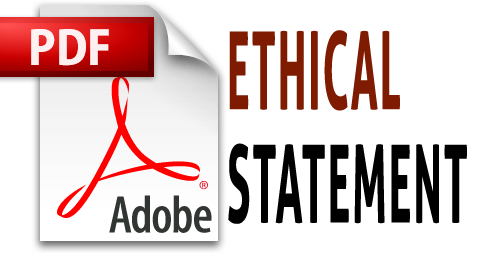DISKURSUS CORPORATE SOCIAL RESPONSIBILITY (CSR) DALAM MEWUJUDKAN SUSTAINABLE DEVELOPMENT GOALS (SDGs)
Abstrak
Corporate social responsibility (CSR) masih menjadi konsep yang ambigu. Ambiguitas terjadi antara lain karena konsep CSR melintasi beberapa disiplin ilmu, yang secara konseptual tidak diajarkan secara komprehensif di lembaga pendidikan dan secara global telah menantang peran serta tanggung jawab dari karyawan, perusahaan dan juga Negara. Terlepas dari persepsi ambiguitas berdasarkan tinjauan literatur yang luas tersebut, secara konsepsual CSR terkait dengan konsep pembangunan berkelanjutan yang pada umumnya dianggap berhubungan dengan pengambilan keputusan bisnis yang mempertimbangkan aspek ekonomi, sosial, dan lingkungan. Bahkan tujuan pembangunan berkelanjutan (SDGs) menjadi isu tersendiri dalam program-program CSR di seluruh dunia, demikian pula Indonesia. Kajian ini dilakukan secara kualitatif dan melalui studi pustaka. Dari ketiga aspek yang berbeda, namun saling berhubungan, studi ini menemukan ada sejumlah besar penelitian yang menilai hubungan antara CSR dengan kinerja bisnis keuangan (ekonomi) dan CSR dengan aspek manusia (sosial), tetapi kurang menilai hubungan CSR dengan aspek lingkungan. Penelitian tentang aspek lingkungan yang sudah dipelajari oleh para pakar masih terbatas, dan berbagi literatur secara signifikan menunjukkan kurangnya integritas atau universalitas. Beberapa hasil penelitian mengklaim bahwa hal tersebut dikarenakan kurangnya kerangka kerja analitis yang sistematis, sehingga kondisi tersebut menantang berbagai pihak untuk mengembangkan berbagai tools untuk mendorong praktik CSR dengan memperhatikan ketiga aspek tersebut, khususnya terkait aspek lingkungan.
Kata Kunci
Teks Lengkap:
PDFReferensi
Abernathy, J. L., Guo, F., Kubick, T. R., & Masli, A. (2019). Financial statement footnote readability and corporate audit outcomes, AUDITING: A Journal of Practice & Theory, 38(2), 1–26. https://doi.org/10.2308/ajpt-52243.
Agudo-Valiente, J. M., Garces-Ayerbe, C., & Salvador-Figueras, M. (2015, January/February). Corporate social performance and Stakeholder dialogue management. Corporate Social Responsibility and Environmental Management, 22(1), 13–31.
Andrade, J. C. S., & Puppim de Oliveira, J. A. (2015, August). The role of the private sector in global climate and energy governance. Journal of Business Ethics, 130(2), 375–387.
Banc, D. (2016). Perspectives on Corporate Social Responsability. Journal of Social
Economy, 6(2), 63-81. Retrieved from http://profitpentruoameni.ro/wpcontent/uploads/2016/12/RES-nr.-2_2016.pdf#page=74 .
Battaglia, M., Passetti, E., Bianchi, L., & Frey, M. (2016). Managing for integration: A longitudinal analysis of management control for sustainability. Journal of Cleaner Products, Part A, 136, 213–225.
Bednar, M. K. (2012). Watchdog or lapdog? A behavioural view of the media as a corporate governance mechanism. Academy of Management Journal, 55(1), 131–150.
Bolis, I., Brunoro, C. M., & Sznelwar, L. I. (2014). Work in corporate sustainability policies: The contribution of ergonomics. Work, 49, 417–431. https://doi.org/10.3233/WOR-141962.
Bowen, H. (1953). Social responsibility of the businessman. New York: Harper & Row.
Buhmann, K., Jonsson, J., & Fisker, M. (2019). Do no harm and do more good too: Connecting the SDGs with business and human rights and political CSR theory. Corporate Governance, 19(3), 389–403. https://doi.org/10.1108/CG-01-2018-0030.
Buzducea, D. (2017). Asistența socială. Compendiu de istorie, teorie și practică [Social
Work. Compendium of History, Theory and Practice]. Iași: Polirom.
Carroll, A. B. (1999, September). Corporate social responsibility: Evolution of a definitional construct. Business & Society, 38(3), 268–295.
Chapman, A., McLellan, B., & Tezuka, T. (2016, September). Strengthening the energy policy making process and sustainability outcomes in the OECD through policy design. Administrative Sciences, 6(3), 1–16. https://doi.org/10.3390/admsci6030009
Collins Dictionary. http://www.collinsdictionary.com. Accessed on 7 November 2016.
Constantine, T. (2015, January). Social responsibility, quality of work life and motivation to contribute in the Nigerian society. Journal of Business Ethics, 126(2), 219–233. https://doi.org/10.1007/s10551-013-1940-7.
Coors, A. C., & Winegarden, W. (2005, Spring). Corporate social responsibility—Or good advertising. Regulation, 28(1), 10–11.
Coy, P., Parkin, B., & Martin, A. (2014, March 24). In trade talks, its countries vs. companies. Bloomberg Businessweek, 4372, pp. 35–37.
Creswell, John W. 1998, Qualitative Inquiry and Research Design, Choosing Among Five Traditions. California: Sage Publication.
Cullen, J. (2013). Measuring the environmental benefits of wind-generated electricity. American Economic Journal: Economic Policy, 5(4), 107–133. https://doi.org/10.1257/pol.5.4.107.
Dahan, N., Doh, J., & Raelin, J. (2015, October). Pivoting the role of government in the business and society interface: A Stakeholder perspective. Journal of Business Ethics, 131(3), 665–680. https://doi.org/10.1007/s10551-014-2297-2.
Dahlsrud, A. (2008, January/February). How corporate social responsibility is defined: An analysis of 37 definitions. Corporate Social Responsibility and Environmental Management, 15(1), 1–13. https://doi.org/10.1002/csr.132.
Danilovic,M., Hensbergen,M., Hoveskog,M.,& Zadayannaya, L.(2015,May). Exploring diffusion and dynamics of corporate socialresponsibility. Corporate Social Responsibility& Environmental Management, 22(3), 129–141. https://doi.org/10.1002/csr.1326.
Davis, K. (1960, Spring). Can business afford to ignore its social responsibilities? California Management Review, 2(3), 70–76.
Demir, G., Cagle, M. N., & Dalkilic, A. F. (2016). Corporate social responsibility and regulatory initiatives in Turkey: Good implementation examples. Accounting & Management Information Systems, 15(2), 372–400.
De Rezende, L. B., Blackwell, P., & Pessanha Goncalves, M. D. (2018, February/March). Research focuses, trends and major findings on project complexity: A bibliometric network analysis of 50 years of project complexity research. Project Management Journal, 49(1), 42–56.
Devin, B. (2016, March). Half-truths and dirty secrets: Omissions in CSR Communications. Public Relations Review, 42(1), 226–228.
De Vries, G., Terwel, B. W., Ellemers, N., & Daamen, D. D. L. (2015, May). Sustainability or profitability? How communicated motives for environmental policy affect public perceptions of corporate greenwashing. Corporate Social Responsibility & Environmental Management, 22(3), 142–154. https://doi.org/10.1002/csr.1327.
Dragomir, G., Serban, A., Nastase, G., & Brezeanu, A. I. (2016, October). Wind energy in Romania: A review from 2009 to 2016. Renewable and Sustainable Energy Reviews, 64, 129–143.
Dumitrescu, D., & Simionescu, L. (2015). Empirical research regarding the influence of corporate social responsibility activities on companies’ employees and financial performance. Economic Computation & Economic Cybermetrics Studies and Research, 49(3), 52–66.
Elkington, J. (1997). Cannibal with forks: The triple bottom line of 21st century business. Gabriola Island, BC: Capstone.
Fremeaux, S., & Michelson, G. (2017). The common good of the firm and humanistic management: Conscious capitalism and economy of communion. Journal of Business Ethics (145), 701–709. https://doi.org/10.1007/s10551-016-3118-6.
Frias-Aceituno, J. V., Rodriguez-Ariza, L., & Garcia-Sanchez, I. M. (2013). The role of the board in the dissemination of integrated corporate social reporting. Corporate Social Reporting and Environmental Management, 20, 219–233. https://doi.org/10.1002/csr.1294.
Friedman, M. (1970, September 13). The social responsibility of business is to increase its profits. New York Times, pp. 122–126.
Frostenson,M.(2016, September). Humility in business: A contextual approach. Journal of Business Ethics, 138(1), 91–102. https://doi.org/10.1007/s10551-015-2601-9.
Gerard, J. A., & Weber, C. M. (2015, June). Compliance and corporate governance: Theoretical analysis of the effectiveness of compliance based on locus of functional responsibility. International Journal of Global Business, 8(1), 15–26.
Garen, J. (2010). On fairness and needs in a free enterprise economy. Journal of Applied Economics and Policy, 29(1), 61–78.
Glavas, A., & Mish, J. (2015, March). Resources and capabilities of triple bottom line firms: Going over old or breaking new ground? Journal of Business Ethics, 127(3), 623–642. https://doi.org/10.1007/s10551-014-2067-1.
Gonzalez-Rodriguez, M. D. R., Del Carmen Diaz-Fernandez, M., Spers, V. R. E., & Da Silva Leite, M. (2016, January/February). Relation between background variables, values and corporate socialresponsibility. Revista de Administracao de Empresas, 56(1), 8–19. https://doi.org/10.1590/s0034-759020160102.
Gotea, M. & Roșculeț, A. (2019). Corporate Social Responsibility and Social Work. Interconnections. Bulletin of the Transilvania University of Braşov. Series VII: Social Sciences. Vol. 12(61) No. 1 https://doi.org/10.31926/but.ssl.2019.12.61.1.12
Gutierrez, R., & Vernis, A. (2016, June). Innovations to serve low-income citizens: When corporations leave their comfort zones. Long Range Planning, 49(3), 283–297.
Hansen, E. G., Zvezdov, D., Harms, D., & Lenssen, G. (2014). Advancing corporate sustainability, CSR, and business ethics. Business & Professional Ethics Journal, 33(4), 287–296
Herremans, I. M., Nazari, J. A., & Mahmoudian, F. (2016). Stakeholder relationships, engagement, and sustainability. Journal of Business Ethics, 138(3), 417–435. https://doi.org/10.1007/s10551-015-2634-0.
Higgins, C., Stubbs, W., & Milne, M. (2018). Is sustainability reporting becoming institutionalised? The role of an issues-based field. Journal of Business Ethics, 147(2), 309–326. https://doi.org/10.1007/s10551-015-2931-7.
Holme, L., &Watts, P. (2000). Corporate social responsibility, making good business sense. Geneva: World Business Council for Business Development.
Ishartono, & Raharjo (2016). Sustainable Development Goals dan Pengentasan Kemiskinan. Share: Social Work Journal (Vol 6, No. 2, hal 159-167)
IPCC. (2013). Intergovernmental panel on climate change, summary for policymakers. Available from https://www.ipcc.ch/pdf/assessment-report/ar5/wg1/WG1AR5_SPM_FINAL.pdf. Accessed on 16 January 2016.
Jia, M., Tong, L., Viswanath, P. V., & Zhang, Z. (2016, October). Word power: The impact of negative media coverage on disciplining corporate pollution. Journal of Business Ethics, 138(3), 437-458. https://doi.org/10.1007/s10551-015-2596-2.
Jonczyk, C. D., Lee, Y. G., Galunic, C. D., & BensaouInsead, B. M. (2016, June). Relational changes during role transitions: The interplay of efficiency and cohesion. Academy of Management Journal, 59(3), 956–982. https://doi.org/10.5465/amj.2013.0972.
Karassin, O., & Bar-Haim, A. (2016, December). Multilevel corporate environmental responsibility. Journal of Environmental Management, 183, Part 1, pp. 110–120
Kealy, T. (2016, October). Impediments in the CSR space: A mixed-method approach. International Journal of Advanced Research, 4(10), 1995–2026. https://doi.org/10.21474/ijar01/2015.
Kealy, Tony. (2020). Evaluating Sustainable Development and Corporate Social Responsibility Projects. Switzerland: Springer
Kearns, A. J. (2017). Rebuilding trust: Ireland’s CSR plan in the light of Caritas in Veritate. Journal of Business Ethics, 146(4), 845–857. https://doi.org/10.1007/s10551-016-3238-z.
Kinley, D. (Ed.). (2017). Human rights and corporations. New York: Routledge. ISBN 9780754627425 (hbk).
Kolmar, M., & Beschorner, T. (2016). Locating responsibility: An extended transaction cost approach. ZeitschriftfuerWirtschafts und Unternehmensethik, 17(1), 118–147.
Kuhnen, M., & Hahn, R. (2019). From SLCA to positive sustainability performance measurement: A two-tier Delphi study. Journal of Industrial Ecology, 23(3), 615–634. https://doi.org/10.1111/jiec.12762.
Kurucz, E. C., Colbert, B. A., Ludeke-Freund, F., Upward, A., & Willard, B. (2017, January). Relational leadership for strategic sustainability: Practices and capabilities to advance the design and assessment of sustainable business models. Journal of Cleaner Production, 140, Part 1, 189–204.
Langer, K., Decker, T., Roosen, J., & Menrad, K. (2016, October). A qualitative analysis to understand the acceptance of wind energy in Bavaria. Renewable and Sustainable Energy Reviews, 64, 248–269.
Lapina, I., Maurane, G., & Starineca, O. (2013). Human resource management models: Aspects of knowledge management and corporate social responsibility. Procedia—Social and Behavioural Sciences, January 2014, 110, 577–586.
Maak, T., Pless, N. M., & Voegtlin, C. (2016, May). Business statesman or shareholder advocate? CEO responsible leadership styles and the micro-foundations of political CSR. Journal of Management Studies, 53(3), 463–493
Maas, K., Schaltegger, S., & Crutzen, N. (2016, November). Integrating corporate sustainability assessment, management accounting, control, and reporting. Journal of Cleaner Production, Part A, 136, 237–248.
MacCormac, S., & Haney, H. (2012, Spring). One viable solution to advancing environmental ustainability. Journal of Applied Corporate Finance, 24(2), 49–56.
Mahoney, L. S., Thorne, L., Cecil, L., & LaGore, W. (2013, June). A research note on standalone corporate social responsibility reports: Signaling or greenwashing? Critical Perspectives on Accounting, 24(4–5), 350–359
Maroun, W. (2019). Exploring the rationale for integrated report assurance. Accounting, Auditing & Accountability Journal, 32(6), 1826–1854. https://doi.org/10.1108/AAAJ-04-2018-3463.
Matuleviciene, M., & Stravinskiene, J. (2015). The importance of Stakeholders for corporate reputation. Engineering Economics, 26(1), 75–83. https://doi.org/10.5755/j01.ee.26.1.6921.
Mea, W. J., & Sims, R. R. (2019). Human dignity-centered business ethics: A conceptual framework for business leaders. Journal of Business Ethics, 160(1), 53–69. https://doi.org/10.1007/s10551-018-3929-8.
Mercier, G., & Deslandes, G. (2017). There are no codes, only interpretations. Practical Wisdom and Hermeneutics in Monastic Organisations. Journal of Business Ethics (145), 781–794. https://doi.org/10.1007/s10551-016-3055-4.
Milne, M. J., & Gray, R. (2013). W(h)ither ecology? The triple bottom line, the global reporting initiative, and corporate sustainability reporting. The Journal of Business Ethics, 118, 13–29.
Mishra, S., & Modi, S. B. (2016, January). Corporate social responsibility and shareholder wealth: The role of marketing capability. Journal of Marketing, 80(1), 26–46. https://doi.org/10.1509/jm.15.0013.
Osagie, E., Wesselink, R., Blok, V., Lans, T., & Mulder, M. (2016, May). Individual competencies for corporate social responsibility: A literature and practice perspective. Journal of Business Ethics, 135(2), 233–252. https://doi.org/10.1007/s10551-014-2469-0.
Pope Francis. (2015). Laudato Si’. Encyclical letter of the Holy Father Francis on care for our common home. Veritas.
Prado-Lorenzo, J.-M., & Garcia-Sanchez, I.-M. (2010, December). The role of the board of directors in disseminating relevant information on greenhouse gases. Journal of Business Ethics, 97(3), 391–424.
Ramlugun, V. G., & Raboute, W. G. (2015). Do CSR practices of banks in mauritius lead to satisfaction and loyalty? Studies in Business & Economics, 10(2), 128–144. https://doi.org/10.1515/sbe-2015-0025.
Rasche, A., & Esser, D. E. (2006). From stakeholder management to stakeholder accountability – Applying Habermasian discourse ethics to accountability research. Journal of Business Ethics, 65(3), 251–267.
Rivera, J. M., Munoz, M. J., & Moneva, J. M. (2017, November/December). Revisiting the relationship between corporate stakeholder commitment and social and financial performance. Sustainable Development, 25(6), 482–494. https://doi.org/10.1002/sd.1664.
Saeidi Pour, B., Nazari, K., & Emami, M. (2014, April). Corporate social responsibility: A literature review. African Journal of Business Management, 8(7), 228–234. https://doi.org/10.5897/ajbm12.106.
Santoso, M. B., Adinegara, R., Ismanto, S. U., Mumajad, I. & Mulyono, H. (2018). Penilaian Dampak Investasi Sosial Pelaksanaan CSR Menggunakan Metode Social Return on Investment (SROI). AdBispreneur: Jurnal Pemikiran dan Penelitian Administrasi Bisnis dan Kewirausahaan Vol. 3. No. 2. 153-167. DOI: https://doi.org/10.24198/adbispreneur.v3i2.18777.
Schaltegger, S., & Burritt, R. (2018, January). Business cases and corporate engagement with sustainability: Differentiating ethical motivations. Journal of Business Ethics, 147(2), 241–259. https://doi.org/10.1007/s10551-015-2938-0.
Schyns, B., & Schilling, J. (2013, February). How bad are the effects of bad leaders? A meta-analysis of destructive leadership and its outcomes. The Leadership Quarterly, 24(1), 138–158.
Schrempf-Stirling, J. (2018, June). State power: Rethinking the role of the state in political corporate social responsibility. Journal of Business Ethics, 150(1), 1–14. https://doi.org/10.1007/s10551-016-3198-3.
Searcy, C., Dixon, S. M., & Neumann, W. P. (2016, January). The use of work environment performance indicators in Corporate Social Responsibility reporting. Journal of Cleaner Production, 112, Part 4, 2907–2921.
Staniskiene, E.,& Stankeviciute, Z. (2018, July). Social sustainabilitymeasurement framework: The case of employee perspective in a CSR-committed organisation. Journal of Cleaner Production, 188, 708–719. https://doi.org/10.1016/j.jclepro.2018.03.269.
Talbot, D., & Boiral, O. (2018). GHG reporting and impression management: An assessment of sustainability reports from the energy sector. Journal of Business Ethics, 147(2), 367–383. https://doi.org/10.1007/s10551-015-2979-4.
Thijssens, T., Bollen, L., & Hassink, H. (2015, December). Secondary Stakeholder influence on CSR disclosure: An application of Stakeholder Salience theory. Journal of Business Ethics, 132, 873–891. https://doi.org/10.1007/s10551-015-2623-3.
United Nations. (2017). Available at http://www.un.org. Accessed on 4 November 2017.
Venter, E., Turyakira, P., & Smith, E. E. (2014, December). The influence of potential outcomes of Corporate Social Responsibility engagement factors on SME’s competitiveness. South African Journal of Business Management, 45(4), 33–43.
Voegtlin, C., & Greenwood, M. (2016, September). Corporate social responsibility and human resource management: A systematic review and conceptual analysis. Human Resource Management Review, 26(3), 181–197.
Wang, S. (2015). Literature review of corporate social responsibility. Chinese Strategic Decisionmaking on CSR, ISBN 978-3-662-44996-7. https://doi.org/10.1007/978-3-662-44997-4-2.
Warren, C. R., Lumsden, C., O’Dowd, S., & Birnie, R. V. (2005, November). Green on Green: Public perceptions of wind power in Scotland and Ireland. Journal of Environmental Planning & Management, 48(6), 853–875. https://doi.org/10.1080/09640560500294376.
Weber, C. M., & Gerard, J. A. (2014). Reconfiguring compliance for corporate social responsibility. Journal of Economic Development, Management, IT, Finance & Marketing, 6(2), 28 36.
Wolsink, M., & Breukers, S. (2010, July). Contrasting the core beliefs regarding the effective implementation of wind power. An international study of stakeholder perspectives. Journal of Environmental Planning and Management, 53(5), 535–558. https://doi.org/10.1080/09640561003633581.
Xu, A. J., Loi, R., & Lam, L. W. (2015, October). The bad boss takes it all: How abusive supervision and leader-member exchange interact to influence employee silence. The Leadership Quarterly, 26(5), 763–774.
Xu, J., Li, L., & Zheng, B. (2016, June). Wind energy generation technological paradigm diffusion. Renewable and Sustainable Energy Reviews, 59, 436–449.
DOI: https://doi.org/10.24198/share.v11i2.37076
Refbacks
- Saat ini tidak ada refbacks.
This work is licensed under a Creative Commons Attribution 4.0 International License.









21.png)
















